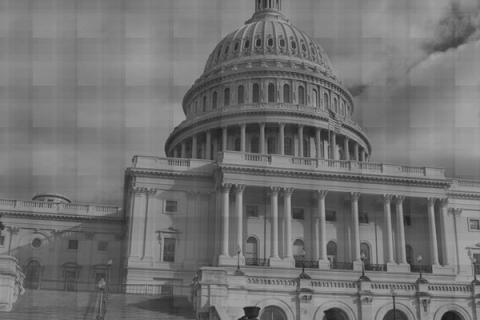 Paul Ryan is not exactly a "small government" conservative. And he surely isn't an anti-war advocate. Not that anyone expected Mitt Romney to pick a Ron Paul-like VP choice, but Republicans may be underestimating their ability to win the votes of the libertarian-right and independent voters. Although Rand Paul is speaking at the convention and there is no sign that his father is going to leave the Republican party, the GOP should not be quick to associated the "tea party" with the vocal libertarians who brought many of Ron Paul's ideas to the mainstream. Here are 4 reasons why the Romney/Ryan ticket helps Obama and benefits Gary Johnson.
Paul Ryan is not exactly a "small government" conservative. And he surely isn't an anti-war advocate. Not that anyone expected Mitt Romney to pick a Ron Paul-like VP choice, but Republicans may be underestimating their ability to win the votes of the libertarian-right and independent voters. Although Rand Paul is speaking at the convention and there is no sign that his father is going to leave the Republican party, the GOP should not be quick to associated the "tea party" with the vocal libertarians who brought many of Ron Paul's ideas to the mainstream. Here are 4 reasons why the Romney/Ryan ticket helps Obama and benefits Gary Johnson.
1. Libertarian-leaning Republicans will not Support Ryan, because he Supported TARP and the Auto-bailouts.
For those who don't remember, the tea party started in 2007 as a grassroots fundraising rally cry for Ron Paul; while Bush was still in office. The movement exploded after the first bailouts were passed by congress and Rick Santelli called for a Tea Party on MSNBC.
Why is this significant? Because, at the time, the GOP was trying to rally their base around John McCain. But, even with Sarah Palin, a favorite of the modern-day tea party, as his running mate, the Ron Paul tea partiers wanted nothing to do with the party nominee.
So this time around, expect a similar reaction from the small government, anti-bailout libertarians. Many of them consider the leadership of the current Democratic and Republican parties to be almost indistinguishable. Like they did with Ron Paul, they might just flock to Gary Johnson in hopes of giving him enough votes to affect the dialogue. And unlike Ron Paul, who is strongly pro-life and has ideas that are quite 'extreme,' Gary Johnson's more temperate libertarianism may be attractive to many voters hesitant to jump onto the Ron Paul bandwagon.
2. Conservative Anti-War Advocates will Fear Paul Ryan because he is a Staunch Interventionist
As the wars continue, non-partisan voters are becoming increasingly disenchanted with our interventionist foreign policy. But, Paul Ryan is a staunch advocate for an agressive foreign policy. Further, his economic plan slashes the budget for diplomatic purposes.
Although the pro-war Bush-era policies of the Republican right may still be attractive to the GOP as a whole, Americans are increasingly weary of calls for war with countries like Iran and Syria. Anti-war advocates would rather promote a non-interventionist like Gary Johnson than support a VP who would cut domestic programs ahead of the defense budget.
3. Gary Johnson has More Experience and a Higher Approval Rating than Romney and Ryan
The two-term governor and successful business man has solid credentials as a conservative business-friendly leader. From Wikipedia:
According to one New Mexico paper, "[Governor] Johnson left [New Mexico] fiscally solid," and was "arguably the most popular governor of the decade . . . leaving the state with a $1 billion budget surplus." The Washington Times has reported that when Johnson left office, "the size of state government had been substantially reduced and New Mexico was enjoying a large budget surplus." According to a profile of Johnson in the National Review, "During his tenure, he vetoed more bills than the other 49 governors combined — 750 in total, one third of which had been introduced by Republican legislators. Johnson also used his line-item-veto power thousands of times."
Whether or not Johnson has a chance of making significant headway in the polls, his small-government record as a popular governor is undeniable. The GOP should not expect the small-government conservatives on the right to be satisfied with Romney's more liberal record or his low approval rating as Governor of Massachusetts.
Adding Paul Ryan to the ticket may be of immediate benefit, but his lack of experience and his support of government intervention, domestically and abroad, do not bode well for the long-haul scrutiny.
4. Gary Johnson will Appeal to Independent Voters that are Tired of Partisanship
As polling, micro-targeting, and a divided media control the political debate, consultants now conduct campaigns by galvanizing their base, rather than persuading voters. But, voters are increasingly frustrated with partisanship that defines the discourse. This sentiment is evidenced by the 40% of American voters now self-identified as non-partisan voters. Support it or not, Paul Ryan's partisan budget does nothing to quell the extreme partisanship that pervades the political dialogue.
With a Google+ following of over 1 million, over 56,000 followers on twitter, over 200,000 followers on Facebook, and a reputation of appealing across party lines, Gary Johnson may just pull some critical votes away from Romney from all different directions.
Like the 1988 Libertarian presidencial candidate, Ron Paul, the support Johnson is likely to build will create a large enough base of supporters to give him a more powerful political voice in the future. And with voters becoming increasingly disenchanted with the parties, combined wit the ability of social media to galvanize movements rapidly, the future may come pretty quickly.
With the addition of Ryan to the Romney ticket, any voice Gary Johnson injects into the dialogue before election day could be a welcome one for Obama.
